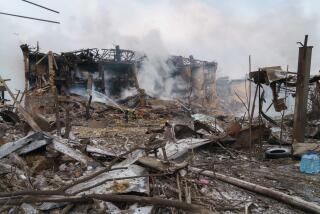U.S. Reaffirms Its Support for Pakistan : Cautions India, Soviets Against Threats in Wake of Zia’s Death
- Share via
WASHINGTON — A senior State Department official said Sunday that the United States has told both the Soviet Union and India of the continuing American interest in protecting the security of Pakistan in the wake of the death of President Zia ul-Haq.
Undersecretary of State Michael H. Armacost said that, in recent days, the United States has sent messages to Pakistan’s two large and powerful neighbors, in effect cautioning against any threat to Pakistan.
Not only has Pakistan been the closest U.S. ally in central Asia, it also has been the conduit through which aid from the United States, China and other countries has been channeled to the guerrilla groups fighting the Soviet-backed government of Afghanistan.
“We affirmed our vital interest in the security of Pakistan,” Armacost said. “There’s nothing secret about our interest in Pakistan. It was a time to reaffirm our interest.”
Armacost, who traveled to Pakistan with Secretary of State George P. Shultz for Zia’s funeral, spoke with reporters at Andrews Air Force Base here after ceremonies for the two American officials who died along with Zia when his plane exploded and crashed.
The bodies of the two officials, U.S. Ambassador Arnold L. Raphel and Brig. Gen. Herbert M. Wassom, the U.S. defense attache in Pakistan, were carried back to the United States aboard Shultz’s Air Force plane. Raphel was the first American ambassador to be killed while performing his duties since 1979.
In ceremonies on Shultz’s return early Sunday, the two flag-draped coffins were carried into black hearses while a tearful crowd of more than 100 relatives, State Department officials, U.S. military officers and officials of the Pakistan Embassy in Washington looked on.
In a brief speech, Shultz drew a connection between the two men’s deaths and American efforts to support the ideals of liberty, freedom, justice, security, prosperity and peace throughout the world.
“Arnie and Herb went halfway around the world to join the fight for these great causes, not just for others but for America,” Shultz said. “If we do not work to shape a world in freedom, peace, prosperity and justice, then here at home those principles will be endangered and could be lost.”
Secretary of Defense Frank C. Carlucci walked alongside Wassom’s widow, Judy, and Shultz similarly escorted Raphel’s widow, Nancy Ely-Raphel, at the memorial service.
Carlucci told participants at the service that Wassom “lived the values that have made our military the honorable, capable and respected institution it is.”
“Recently, when I visited Pakistan, I saw firsthand the difference he made in our relations with the Pakistani military,” Carlucci told the participants. “He died alongside some of those with whom he had worked so closely and effectively.”
In addition to Zia and the two Americans, the plane crash last Wednesday killed 27 other people, including Gen. Akhtar Abdur Rahman, chairman of Pakistan’s joint chiefs of staff; Gen. Mian Mohammed Afzaal, deputy army chief of staff, and several other of Pakistan’s highest-ranking military officers.
Officially, the State Department is refusing to comment on possible causes of the crash. In public statements, officials emphasized that they want to give two teams of U.S. investigators who arrived in Pakistan on Sunday enough time to carry out their inquiry.
“The teams have just started work, so there is no basis for speculation,” State Department spokesman Charles Redman said Sunday after returning from Zia’s funeral.
Privately, U.S. officials and experts on Pakistan are theorizing that the crash may have been the result either of a missile attack carried out by the Afghan government’s intelligence agency, Khad, or of a bomb sneaked aboard the plane by internal enemies of Zia or his generals.
“I don’t know of any consensus in the intelligence community, but certainly Khad would be high on a list of suspects,” one State Department official said. Like some other experts, this official said he thought it unlikely that Khad would have been able to plant a bomb aboard Zia’s closely guarded plane that would be capable of causing such a crash.
“A C-130 is a pretty rugged plane,” he said. “Any bomb would have had to be either very big or very well placed.”
“If it’s a bomb, it must have been an inside job,” said Paul Kreisberg of the Carnegie Endowment for International Peace, a specialist on Pakistan. “If it’s a missile, then all bets are off.”
However, Kreisberg said he does not believe that the Afghan intelligence service should be considered suspect if the investigators turn up evidence that the crash was caused by a missile. Because of the huge influx of weapons to the Afghan guerrilla groups, he said, “you can buy missiles (in Pakistan) as easily as brake fluid.”
More to Read
Sign up for Essential California
The most important California stories and recommendations in your inbox every morning.
You may occasionally receive promotional content from the Los Angeles Times.












